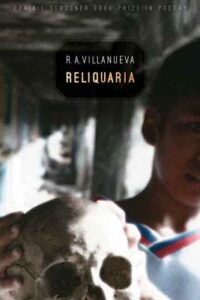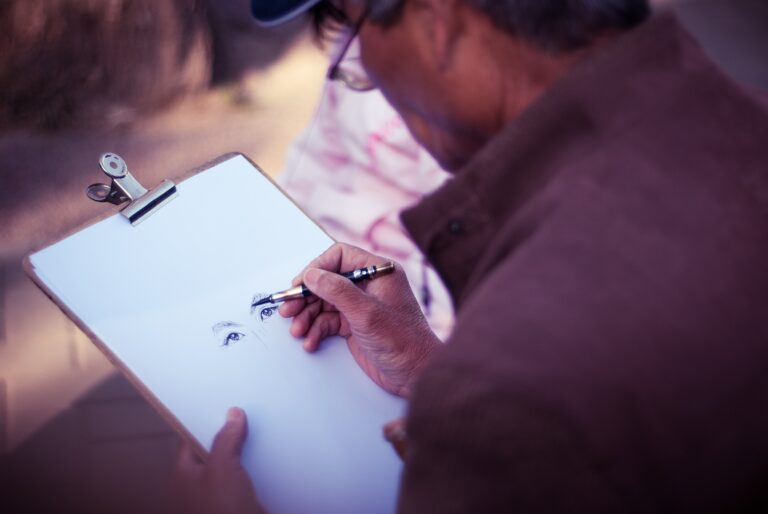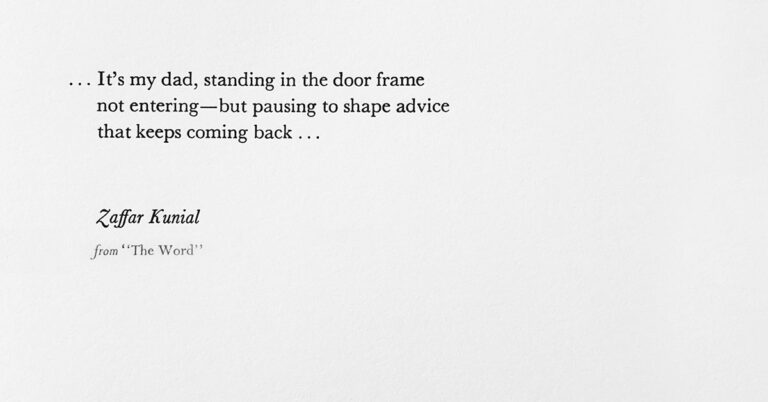R.A. Villanueva
Life Drawing
Who do you trust with your body?
In this poem, a man writes about his wife’s life-drawing class. She’s been sketching a naked male model for weeks, and the poet worries, comparing himself, trying to figure out how he feels. This poem moves from anxiety to request to consent to reciprocality. His self-consciousness about sharing his body with someone is transformed into trust and vulnerability.
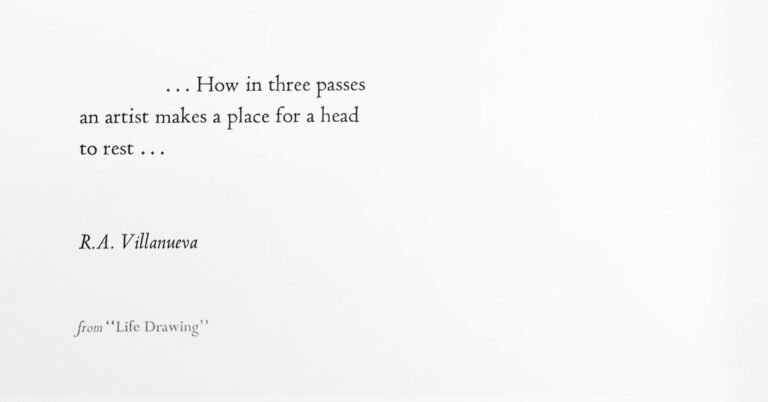
Image by Expedition Press/Expedition Press, © All Rights Reserved.
Guest
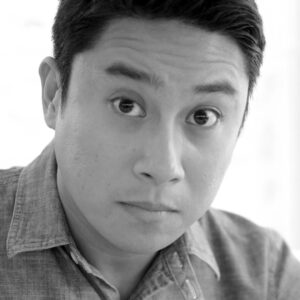
R.A. Villanueva is the author of Reliquaria, winner of the Prairie Schooner Book Prize in Poetry. His honors include commendations from the Forward Prizes and fellowships from Kundiman and the Constance Saltonstall Foundation for the Arts. He teaches at Sarah Lawrence College and lives in Brooklyn.
Transcript
Pádraig Ó Tuama, host: My name is Pádraig Ó Tuama, and I love, love poetry, because love poetry, rather than describing the entirety of love between people, or trying to describe the technicalities of sex, can sometimes just go into a small moment and speak of the gaze of a lover’s ear, or the taste of their neck, or the feel of their hand on your back. And that brings us to an intimacy that is both private as well as inviting.
[music: “Memoriam” by Gautam Srikishan]
Ó Tuama: “Life Drawing” by R. A. Villanueva
“How she is quiet before his robe falls
each week to his ankles. This man who sits, nude
for my wife, whom she draws with Conté sticks
and pastel pencils. Each page in her notebook
is a parade of his torsos, galley proofs
of breastbones and chests. She explains
because these lines are my favorite
and shows me, traces with her knuckle tip
chin to sternum, jaw to shoulder, clavicle to cusp
of the arm. How in three passes
an artist makes a place for a head
to rest. Later, in blue and orange
pigments mixed at the edge of a knife, thinned
with linseed oil and mineral spirits,
my wife will paint him on a canvas
primed black. Again his body will end
just above the pelvis, will fade
into a fog of armrest or shadow, cushion
or hip as if rendered in some fugitive dye.
Because he is only the second man I have seen naked,
in person. His, just the third I have seen in my life.
When I tell my wife I want to write about her
naked, sketch her back’s faint taper
as a class might to check perspective, describe
the moles I notice on the underside of a breast
as we make love, she says I can. And, in return,
she will paint the whole of me, bare
from the neck down as I pose
in our living room. No one will even know
this is you. The light will blank out your face.”
[music: “The House You Wake In” by Gautam Srikishan]
Ó Tuama: I love this poem because it’s so intimate. And there’s a sense of intimacy, and also, some anxiety in it, an anxiety that’s met by skill and love. It feels like it’s a poem about a certain kind of masculinity, as well as marriage and vulnerability, and trust within that marriage and vulnerability.
The poem is in three turns, and each turn has focus on a different body. And the first turn is the longer one. We hear of the artistry of the poet’s wife and how she sees this model’s body and she sketches page after page each week. And then secondly, we hear about the poet wants to write a poem about his wife’s body when naked. And then thirdly, just at the end, we hear of how the woman in this poem, the woman he loves, turns the gaze back on him and asks him to pose naked for her. So we have these parade of bodies that are asking for attention. And each one of them is a respectful attention. And partly the question is, how do we cope with jealousy, with the gaze, with anxiety, with vulnerability and respect and consent, in the question of looking at bodies?
The book is dedicated to Jennifer, who’s called “Friend, Everything.” Presumably, that’s his spouse. But in this poem, we don’t hear the name of this person. She’s “she” or “my wife.” And there’s so much about her. She’s kind of slightly off-center but in-center at the same time.
And she goes from being “my wife” to “she” to “an artist” back to “my wife.” She’s so populated with all this skill, in the poem, and she’s comfortable talking about the models and the men she has encountered. And she gives consent when her husband wants to paint her with words, and she returns the steady gaze of seeing and attention by painting the whole of him, as he writes about the whole of her. There’s beautiful reciprocality in this poem. And the poem resolves itself into this ease and trust and reciprocality, even though the opening voice of it seems a little bit anxious about this man, perhaps in a certain form of received masculinity, wondering about the fact that his wife is in a room with another naked man, week after week, sketching this man.
[music: “What Did You Not Here” by Gautam Srikishan]
Ó Tuama: The nakedness at the beginning of this poem is not a nakedness of intimacy. And it’s not a crude nakedness, it’s almost functional. Somebody is being paid to be a model, and the artist is quiet before the model disrobes. And then the encounter happens, for the purpose of learning how to sketch a body. And then it seems like the poet’s voice is worried about that — what is that intimacy? The poet isn’t sharing in that, and the poet is wondering about the intimacy and skill and gaze that his wife is sharing with another naked man in a room, week after week.
The fourth line of the poem says, the “man who sits, nude / for my wife, whom she draws with Conté sticks // and pastel pencils. Each page in her notebook” — on the fourth line there, “pastel pencils,” “page,” the repetition of the “p-p-p,” I think, is drawing attention to “penis.” But it’s not saying it, but he’s anxious about saying it. And so this repeated alliteration, I think, is showing some of the anxiety that he has. And then, as it comes to later on, “stopping just above the pelvis,” and then him, later, “bare from the neck down,” there’s an anxiety about his own body and a male body, and what does it mean to have a male body? Does she prefer the model’s male body to her husband’s male body? And maybe competition and comparison are coming into this poem.
And then it changes. Suddenly, rather than it being an encounter of art and skill in a life modeling class, it changes to being nakedness between two spouses, and the things that he notices. And he asks permission to write about her naked, to “sketch her back’s faint taper
as a class might to check perspective” and “describe // the moles I notice on the underside of a breast / as we make love.” And she gives consent. And this seems to show that the question of naked body to artist and the question of naked bodies between two spouses, two lovers, is always about consent and respect and asking and receiving. And this is something that changes his engagement.
He seems almost, at the start, to be possessive, a small echo of some old masculinist form of anxiety about “my wife.” And then that changes in the reciprocality and consent that’s shared between them, as he asks permission to write about her and she says yes, “but — provided I can draw you, too, your whole body.”
[music: “Ashed to Air” by Gautam Srikishan]
Ó Tuama: One of the things you hear in this poem, particularly as it resolves into the question as to whether he can write about her and whether she can paint him, is that there’s vulnerability, and there’s anxiety, and there’s beauty as they look at each other. But there is none of the performance of, my body isn’t perfect here and my body isn’t perfect there, and forgive this and forgive that, or worrying about being judged. It’s an invitation into the vulnerability of that, rather than thinking that the person who is looking at you — person you love — rather than thinking they’re going to look at you in judgment and comparison.
And that, I think, is a quality of long-term relationships between lovers — that there’s this question of the body that becomes fluent; that we become loving and fluent in the language of each other’s changing bodies, and that there’s trust in that kind of exchange.
[music: “Blue Dot Sessions” by Blue Dot Sessions]
Ó Tuama: The last line, “No one will even know / this is you. The light will blank out your face.” — it makes me think that somehow their love is transcendent, that this piece of art is being lifted up to the light. Clearly, she is painting him from the neck down, as he poses in the living room, but “The light will blank out your face” makes me think that this is the light of their love; that there is something about the gaze of love between her and him, as she looks at his body; that somehow it’s their eyes that are looking at each other. And the eyes are filled with the light of love. And that’s the invitation that she’s inviting him into, the ease and reciprocality and consent that she is inviting him into — that that is almost sacred.
[music: “Into the Earth” by Gautam Srikishan]
“Life Drawing” by R. A. Villanueva
“How she is quiet before his robe falls
each week to his ankles. This man who sits, nude
for my wife, whom she draws with Conté sticks
and pastel pencils. Each page in her notebook
is a parade of his torsos, galley proofs
of breastbones and chests. She explains
because these lines are my favorite
and shows me, traces with her knuckle tip
chin to sternum, jaw to shoulder, clavicle to cusp
of the arm. How in three passes
an artist makes a place for a head
to rest. Later, in blue and orange
pigments mixed at the edge of a knife, thinned
with linseed oil and mineral spirits,
my wife will paint him on a canvas
primed black. Again his body will end
just above the pelvis, will fade
into a fog of armrest or shadow, cushion
or hip as if rendered in some fugitive dye.
Because he is only the second man I have seen naked,
in person. His, just the third I have seen in my life.
When I tell my wife I want to write about her
naked, sketch her back’s faint taper
as a class might to check perspective, describe
the moles I notice on the underside of a breast
as we make love, she says I can. And, in return,
she will paint the whole of me, bare
from the neck down as I pose
in our living room. No one will even know
this is you. The light will blank out your face.”
[music: “Praise the Rain” by Gautam Srikishan]
Lily Percy: “Life Drawing” comes from R.A. Villanueva’s book, Reliquaria. Thank you to University of Nebraska Press who gave us permission to use R.A.’s poem. You can find a link to the poem in our show notes, along with Pádraig’s guiding question for this episode.
Poetry Unbound is Chris Heagle, Erin Colasacco, Serri Graslie, Eddie Gonzalez, Lilian Vo, Christiane Wartell, Karen Navarre, Karyn Towey, Sue Ariza, and me, Lily Percy. Our music is composed and provided by Gautam Srikishan and Blue Dot Sessions. This podcast is produced by On Being Studios, which is located on Dakota land. We also produce other podcasts you might enjoy, like On Being with Krista Tippett, Becoming Wise, and This Movie Changed Me — find those wherever you like to listen or visit us at onbeing.org to find out more.
Books & Music
Recommended Reading
The On Being Project is an affiliate partner of Bookshop.org and Amazon.com. Any earnings we receive through these affiliate partnerships go into directly supporting The On Being Project.





